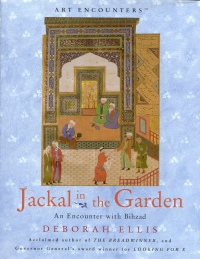| ________________
CM . . .
. Volume XIII Number 5 . . . .October 27, 2006 
 |
Jackal in the Garden: An Encounter with Bihzad. (Art Encounters).
Deborah Ellis.
New York, NY: Watson-Guptill Publications (Distributed in Canada by Georgetown Publications), 2006.
182 pp., cloth, $19.95.
ISBN 0-8230-0415-5.
Grades 10 and up / Ages 15 and up.
Review by J. Lynn Fraser.
**** /4
Reviewed from Uncorrected galleys.
|
| |
|

Murder, history, politics, and gender issues make for a dramatic read in Deborah Ellis’ Jackal in the Garden. Ellis successfully conveys her main character’s isolation from her society due to her physical differences. The reader is made well aware of the perils of being different in certain societies, and to some extent our own:
I wondered which among them would joyfully turn me in to the mob once they saw my monstrous features. We all wear masks, and often masks of compassion and intellect hide true meanness and cowardice. For all their fine thoughts and words and talents, most, I’d no doubt, would equate ugliness with evil and not be able to make the leap beyond it.
Throughout the book, the main character, who is called Anubis, negotiates and thinks her way through various problematic situations and while doing so demonstrates insight about the human condition:
“It suddenly occurred to me that, outside of their cushioned world of praise and poetry, these men were not wise at all.”
While the reader learns about the trials of Anubis, the reader is also introduced to the society in which she lives---Persia in the late 1400s and early 1500s.
Ellis’ book is part of a series called "Art Encounters" which is designed to acquaint the reader with the lives of famous artists. Through Anubis’ life, we glimpse a view of the life of the famous Persian artist named Bihzad (Kamal al-Din Bihzad (1460-1535)). It is one that is a polar opposite to that of Anubis’ life, and yet they are able to form a friendship based on their common interests in the shadings of human nature:
I spotted Bihzad. He was sitting on the side of a stone pond, sprinkling crumbs of food into the water for the fish.
“Do you ever wonder what fish think about? He asked, as I sat beside him on the edge of the pond…
“I have lived apart from fish, I replied. “I’d like to know the answer to your question, …If all fish know is water, could they possibly think about anything else?”
“All we humans know is life on the ground, here and now, yet our minds take us to infinite times and places.”...
I looked up to see Bhizad looking at me. I could see kindness in his face, mixed with vagueness I had seen before. He gave the impression of looking at one thing but seeing something completely different.
Bizhad, a respected master painter in his society, also has the ability to express insight in his artwork:
I looked again at the picture he had drawn. Even without the colors added, the details were clear---the expressions of disdain on the faces, the postures of exclusion. I looked especially at the man on the outside.
“He doesn’t seem bothered that they won’t acknowledge him,” I said. “There is no longing in his face, or shame.”
“That’s because he knows who he is,” Haji said. “He doesn’t need his wisdom or his talent confirmed by people who think they are important. He is complete in himself.”
The reader is made aware that, despite his talent and acclaim, Bizhad is a servant to a powerful master and a slave to what we would now call depression. In his example, the author shows the reader that great talent and privilege do not guarantee a trouble free life and that isolation comes in various forms.
A problem that does exist is that it is hard to visualize the art that Bizhad creates. Reproductions of the Bizhad’s work would have been illustrative. The chapter at the end of the book which gives an overview of the artist’s life is very helpful as are the timeline and the bibliography, also located at the back of the book. The reader will, however, have strong sense of the personalities of the various characters Anubis meets as well as the time and place in which the story is set.
Violence is alluded to in the book but is not described in detail. There are many life lessons passed on through the storyline and characters’ lives and in their perceptions of events and each other. The author should be applauded for conveying a layered view of human nature and a multi-dimensional society within an event-filled adventure book.
Jackal in the Garden is a well-written book for a mature, teenaged audience.
Highly Recommended.
Located in Toronto, ON, J. Lynn Fraser is a freelance writer and editor whose magazine articles appear in national and international publications.

To comment
on this title or this review, send mail to cm@umanitoba.ca.
Copyright © the Manitoba Library Association. Reproduction for personal
use is permitted only if this copyright notice is maintained. Any
other reproduction is prohibited without permission.
NEXT REVIEW |
TABLE OF CONTENTS FOR THIS ISSUE
- October 27, 2006.
AUTHORS |
TITLES |
MEDIA REVIEWS |
PROFILES |
BACK ISSUES |
SEARCH |
CMARCHIVE |
HOME |
